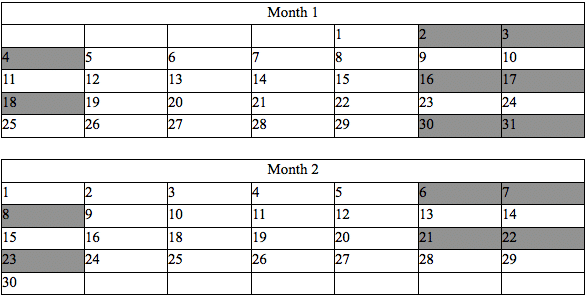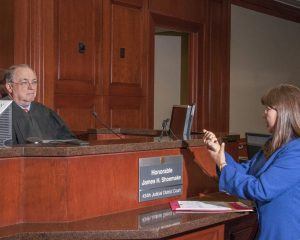Child Support & Child Custody — Preserving Your Relationship With Your Child

Vonda Covington has the experience and common sense to help you understand the legal process and the legal jargon. She can help guide you to developing productive co-parenting agreements, while safeguarding your interests in fair child support and child custody or conservatorship arrangements. Call (281) 503-7373 for an appointment with Vonda now.
Family law cases that involve children deal with many parenting issues, including where the children will live, what decision-making rights and duties each parent will have, the times each parent will have with the children, and how the children will be supported financially. The guiding principle the court uses to make these decisions is the best interest of the child, and the court has wide discretion in determining best interests. This fact gives the judge of your case a lot of power over your life.
You give the judge that power over your life if you and your spouse can’t agree on parenting issues. With some people and on some issues, it may be impossible to agree, but Vonda’s training as a collaborative law attorney and mediator is valuable in helping you navigate through potential disagreements to working solutions. Whenever possible, it’s in your interests and your child’s interests to try to reach a fair agreement on parenting issues without handing the issue over to the court to decide. Call (281) 503-7373 for an appointment to talk with Vonda about your situation and your goals for yourself and your children. You can also send Vonda an email through our contact form.
“Top notch, guided me through the process effortlessly. And most importantly, a genuinely nice person who has her client’s best interest at heart.”
-MP Hunt
Conservatorship (aka Child Custody)
In Texas, there is a presumption that it is in the child’s best interest to have a close relationship with both parents. When the parenting relationship is established by the court, the parties are usually appointed as joint managing conservators. One parent usually has the exclusive right to designate the primary residence of the child. This is the custodial parent of the child. The custodial parent is usually also granted the exclusive right to receive and give receipt for periodic payments for the support of the child and to hold or disburse these funds for the benefit of the child (to receive child support). The court then sets out the rights, duties, and responsibilities of the parents, which can be awarded to each parent independently, to the parents by agreement, or exclusively to one parent.
Following are the rights, duties, and responsibilities that the court must divide:
- the right to consent to medical, dental, and surgical treatment involving invasive procedures;
- the right to consent to psychiatric and psychological treatment of the child;
- the right to represent the child in legal action and to make other decisions of substantial legal significance concerning the child;
- the right to consent to marriage and to enlistment in the armed forces of the United States;
- the right to make decisions concerning the child’s education;
- the right to the services and earnings of the child (what if your 12-year-old is a rock star earning $23 million a year?);
- the right to act as an agent of the child in relation to the child’s estate if the child’s action is required by a state, the United States, or a foreign government (for instance, that rock star needs to file a tax return); and
- the duty to manage the estate of the child to the extent the estate has been created by community property or the joint property of the parents (college savings accounts).
When deciding how these rights, duties and responsibilities should be divided, keep in mind that decisions made independently can conflict with each other, but if an agreement is required and the parents don’t agree, nothing happens. For instance, if each parent has the independent right to consent to invasive medical treatment, one parent might consent to one type of treatment and the other to another type. Either parent has the right to decide. And if an agreement is required and one parent refuses to consent, the child does not get the treatment.
The decision of how the parental rights, duties and responsibilities are divided can be tailored by the parties if they reach a settlement. If the case goes to trial and our client wants to have exclusive decision-making ability for a certain type of decision, we will need to develop and present evidence on that issue so that the judge can rule on it.
If the court finds that the parties just cannot communicate at all, or if the court finds a history of domestic violence, the court may appoint one parent as the sole managing conservator and the other parent as the possessory conservator. The sole managing conservator has the exclusive right to designate the primary residence of the child (or custody, if we spoke English), and all the other rights listed above exclusively. The possessory conservator has none of those rights, but gets visitation and pays child support.
Geographic Restriction – Child’s Residence
If one of the parties asks for it, the court will almost always restrict the child’s residence to a certain geographic area, usually the child’s county of residence and contiguous counties. It is very difficult to overcome the geographic restriction if it is requested. It will not apply, though, if the noncustodial parent moves away. The purpose of the geographic restriction is to assure that the child has an opportunity to spend time with both parents. If the noncustodial parent does not use his or her parenting time, the court might remove a geographic restriction, or even not grant it.
Parenting Time or Child Visitation
Vonda prefers the phrase “parenting time” to visitation or possession to describe the time that is designated for each parent to have with the child.
The court will specify in its order the periods of time that each parent has the right to have the child. All possession orders start with “IT IS ORDERED that the conservators shall have possession of the child at times mutually agreed to in advance by the parties, and, in the absence of mutual agreement, it is ORDERED that the conservators shall have possession of the child under the specified terms set out in this Possession Order.” In other words, the possession order only applies if the parties have not reached other agreements earlier. If the parties do not agree to parenting times, the parenting times set forth in the possession order control.
If the parenting time is court ordered, rather than decided between the parties, you will probably have a schedule referred to as the Standard Possession Order or SPO. In a nutshell, the noncustodial parent gets the child each first, third and fifth Friday weekend from 6:00 p.m. on Friday to 6:00 p.m. on Sunday.

If you look at Month 1 above, you will see that the 2nd, 16th, and 30th are the first, third and fifth Fridays of the month. With an SPO, the noncustodial parent will pick the child up at 6 p.m. on those Fridays and return the child at 6 p.m. on Sunday of that weekend. The noncustodial parent will then have the child again on the first Friday weekend of the following month, getting back to back weekends. This happens about four times a year.
In addition to the weekend parenting time, the noncustodial parent gets the child each Thursday during the school year from 6 p.m. to 8 p.m. and for thirty days during the summer (provided the parents live within 100 miles of each other).
The noncustodial parent has the option of asking for an Expanded Standard Possession Order, in which that parent gets the child at the time school lets out on the first, third and fifth Friday and returns the child to school Monday morning. In the expanded SPO, the noncustodial parent also gets the child from the time schools lets out on Thursdays during the school year until school starts the next day.
The court will divide up holidays, Spring Break, and the child’s birthday. The custodial parent can have one of the other parent’s weekends during the summer, and can get one weekend during the other parent’s 30 day summer parenting time.
If the parents live more than 100 miles apart, the non-custodial parent gets every Spring break (instead of alternating) and 42 days during the summer in the SPO.
Child Support and Medical Support
In Texas, we have child support guidelines. The noncustodial parent typically pays child support, which is based on that parent’s net earnings. Net earnings are the gross pay minus FICA minus income taxes at the single rate minus the cost of the children’s health insurance. The noncustodial parent (also called a child support obligor) pays a percentage of his or her net pay. The percentage increases with the number of children. If the obligor also has a duty to support other children, the percentage is slightly decreased.
The court expects to order child support in any case involving children. If the parties agree not to have child support, we need to show the judge why this arrangement for financial support is in the children’s best interests.
The parents are also ordered to provide medical support for the children. One or both parents are ordered to have health insurance for the children. Usually, regardless of who provides the insurance, the child support obligor is ordered to pay for it; if the other parent has the health insurance through work, the obligor has to reimburse the other parent. The court order will also designate the percentage that each parent will pay of uninsured medical expenses (e.g, co-pays, deductible).
Best Interests of the Children: The Court’s Prime Directive

If the judge is deciding on parenting issues, the judge is not generally swayed by what the parents need. It is the children’s needs that concern the court. For instance, in setting the amount of child support, the court will not take into consideration the amount of debt the child support obligor has; the court feels that each parent has a duty to support the children and that duty is more important than paying creditors. That mom is having difficulty letting go of a small child for overnight visitation with dad is not persuasive; however, if there is a compelling reason for the child for not spending the night with dad, the court may deviate from the standard possession order. So when we ask the court to issue orders that involve customized solutions, we need to show the court why the customized solution is best for the children and what that solution might be.
Resolving Child Support, Child Custody and Child Visitation Issues
If you are involved in a child custody fight, you will want to know what to expect from the courts, and how to go about protecting your rights as a parent and your children’s rights. You may know very little about your rights and legal obligations. You may believe that the courts automatically give custody to the mother or that it is very difficult for a father to get custody.
Vonda can dispel the myths and help you understand what your rights and obligations are and what to expect in a custody fight. She will work to find creative solutions to complex problems. Vonda finds working on child custody and parenting cases rewarding. She knows that what she does can make a profound difference in the life of a child (and in the life of a parent).
Vonda is a divorced mother. Her experience is that parenting has been the single most challenging undertaking of her life.
Vonda and her son’s father were divorced in 2006 when their son was 9 years old. She and her ex-husband, Ron, have successfully raised their child together, despite the fact that they are divorced. They discussed any little thing that is important to their child. They worked together on planning special events and they cooperated with parenting times so their child could be involved with both extended families. They even bought their child’s parrot together. Vonda’s child, now a young adult, has commented on how grateful he is that Vonda and Ron worked together successfully as co-parents. See his blog on this website.
Vonda’s heartfelt desire is to help her clients have the kind of co-parenting relationship with their other parent that she has had. It takes conscientious effort, especially during the early stages of a break-up, but it is so worth it for the kids!
Vonda handles cases involving parenting issues for same-sex and transgender parents, as well as in divorces and cases where the parents are not married.

